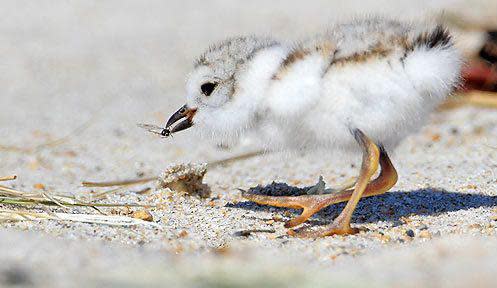Hampton Beach fireworks shows called off. The reason? Piping plovers are nesting.

HAMPTON — Fireworks shows at Hampton Beach will be put on hold through at least June due to federally protected piping plovers nesting nearby. Officials are hopeful they may be able to resume fireworks shows on the Fourth of July.
Fireworks scheduled for Memorial Day weekend and for June 18 are canceled because two nests were found on the beach, according to Chuck Rage, chairman of the Hampton Beach Village District. One is located across from A Street just south of the Lady of the Sea New Hampshire Marine Memorial, the other on the sand across from Bernie’s Beach Bar.
Weekly Wednesday fireworks shows are slated to begin June 22. Rage said the Wednesday dates, which also includes June 29, have not been officially canceled yet.
"We're watching these birds," Rage said.
Hampton Beach: Ocean Wok founder Matthew Fan returns to revive restaurant
The plovers, which are roughly 7-inch shorebirds weighing about 2 ounces, have nested at Hampton Beach for several years. They had traditionally chosen locations like at the dunes near the Hampton Beach State Park parking lot, south of the main beach area where the fireworks shows are held. That changed in 2020 when state beaches, including Hampton, were closed to the public due to the COVID-19 pandemic. This gave the birds a chance to roam more freely and choose new spots for nesting. Fireworks were delayed that summer due to the nests, and then again the following year when the birds returned to their new favored spot on the beach.
“Once they nest in a spot, they keep going back to the same spot,” Rage said.
Piping plovers population increasing
One reason the birds may be coming back to locations like Hampton Beach is their numbers have grown in recent years, according to wildlife biologist Brendan Clifford of New Hampshire Fish and Game. Plovers disappeared in New Hampshire in the 1980s, then reappeared in 1997, he said, and since then conservation efforts have helped them gain population.
Seacoast news: Download the Seacoastonline mobile app to stay connnected
The plovers are expected to reach a new record in New Hampshire this year with 16 nests total, Clifford said. He said nests are also located at Seabrook Beach. The growth in numbers means there is less space for the pairs of plovers at their normal area near the Hampton Beach State Park parking lot, and Clifford said they may have ventured north out of necessity.
The nest near A street has four eggs that are expected to hatch this weekend, Clifford said, after which they may leave for a section of the beach that is better for raising young. They could be gone within a day, he said, expected to walk their chicks to the northern section of the beach where there is seaweed and better cover for their young.
The nest near Bernie’s only saw its first egg laid Thursday, Clifford said, and they take an average 27 to 28 days to hatch. The nests are roped off to give them about 100 yards by 50 yards of space.
Federal law dictates it is a felony to harass or destroy piping plovers, their eggs or their nests. Clifford said the law does not prohibit fireworks from going off near plovers but said the cancelation is recommended. He said any entity like the Village District that inhibits the plovers’ nesting is likely to face significant fines for negligence, and that the nests are within a half mile of the fireworks, a distance shown to be detrimental to the birds.
“That’s too close. The birds are going to potentially abandon the nest. It’s just really jarring for them,” Clifford said.
Hampton Beach: Big events returning in 2022. Here's the lineup
Clifford said plovers have been competing with beach resorts since after World War II when the coastline saw a new boom in vacation activity. The plover numbers dropped dramatically until 1986, when they were listed as federally threatened. Clifford said New England has since become a leader in conservation, helping their numbers rise.
“Right now, New England is above goal,” Clifford said. "We’re carrying a lot of the population.”
Clifford said it will be several years before numbers rise along the entire Atlantic coast enough for the species to be removed from threatened status. In the meantime, he said, the Hampton Beach Village District could try to acquire a federal Habitat Conservation Plan to discourage the birds from nesting near their fireworks setup. That would be about a year’s process, he said, and could cost tens of thousands of dollars and require the district to take measures like improving alternative nesting areas and paying into predator management measures.
“If you want human use of the beach and the fireworks, you’re going to have to mitigate for the plovers being there,” Clifford said.
Rage said the Village District will need to learn more about the application for the Habitat Conservation Plan. However, he said, the potential of canceling fireworks each May and June is a concern.
“I think it’s something we’ll have to deal with,” Rage said.
This article originally appeared on Portsmouth Herald: Hampton Beach NH: Fireworks shows canceled due to piping plovers
